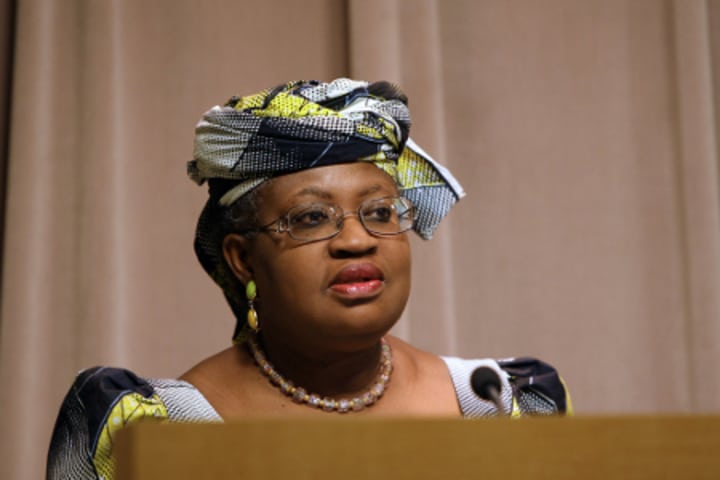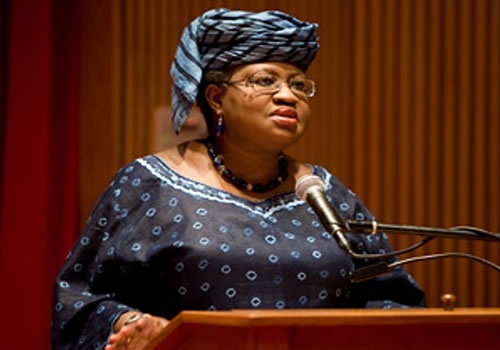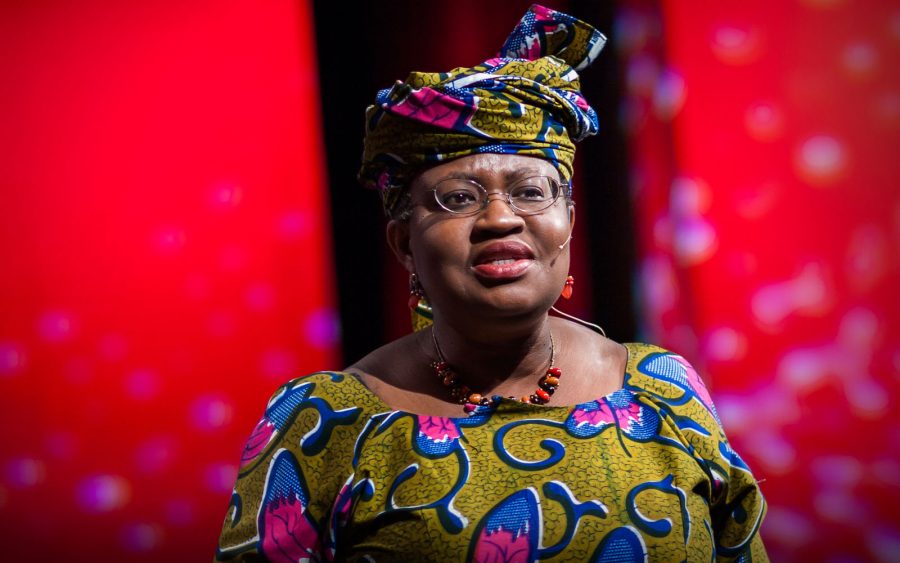Chuks Iloegbunam
If the current controversy surrounding the search for a replacement for the outgoing director-general of the World Trade Organisation (WTO), the Brazilian Roberto de Azevedo, were not global and intense, it would mean that the position was worth little more than a sinecure. Appointed in 2013, Mr. de Azevedo has served notice that he will step down this August, a year before his term concludes.
Up came eight candidates from all regions of the world, three of which are Africans: Nigeria’s Ngozi Okonjo-Iweala; the former Kenyan foreign minister Amina Mohamed, who previously was the chairperson of the WTO General Council; and Abdel-Hamid Mamdouhm, an Egyptian lawyer who also had a stint as a senior WTO official. Because the headship of the WTO is not geographically rotational, no region of the world can claim it is its turn to produce the organisation’s next D-G.
However, there’s a good a case for an African to be appointed this time around. In its 25-year history, no African has ever headed the WTO. Yet, “Africa represents a key bloc within the WTO. It accounts for nearly 27 percent of membership and 35 percent of members from developing countries,” argue Professors Mzukisi Qobo and Mills Soko of the University of Witwatersrand in South Africa.
In an article entitled Why one of three African candidates fits the bill as the new head of the WTO, Soko, a Professor of International Business & Strategy at Wits Business School, and Qobo, the Head of Wits School of Governance, strike a mighty blow for Dr. Okonjo-Iweala’s candidacy: “In our view, of the three African contenders, none is better qualified than Okonjo-Iweala to lead the WTO in the next phase of its 25-year history, which is poised to be the most fractious and challenging.
“The WTO plays an important confidence-building role in the global economy, and the interests of poor countries will be best served in a stronger multilateral trading system that is responsive to their development concerns.
“The nature of the institution requires a leader with significant political heft and who commands the respect of all member countries, rich and poor…
“Okonjo-Iweala is suitably qualified to serve at the helm of the institution. She is a Harvard-educated political heavy-hitter with the skills and experience to cajole, knock heads together and break logjams. She is regarded as a consensus builder who enjoys the confidence of governments, business and multilateral institutions. As Nigeria’s finance minister, she successfully spearheaded the negotiation of an $18 billion debt write-off for the county with the Paris Club creditor nations.
“Her political acumen and extensive negotiating skills could contribute towards restoring the multilateral trade agenda. This has collapsed amid the Trump administration’s hostility towards multilateralism.
“With her origins from a neutral developing country, she could be the right candidate the embattled WTO needs to broker truce between the US and China and end their trade conflict, which has led to institutional collapse.
“Okonjo-Iweala also boasts a credible tract record of economic reform and political sway. Following a long stint as a senior executive at the World Bank, she twice served as Nigeria’s finance minister between 2003 and 2015. During this period, she took on vested interests and implemented far-reaching reforms. These included overhauling a corrupt fuel-subsidy scheme, cutting delays at the country’s ports, creating an oil fund to stabilise the economy, increasing transparency by publishing the government’s monthly finances, and introducing an electronic tax system that curbed illegal diversion of funds…
“Her global finance expertise, in particular, would serve the WTO well given the nexus between trade and finance in the world economy, accentuated by the current economic crisis. By not being a WTO insider, she would bring a much-needed fresh perspective to the institution.”
It is apposite to state that much of Mrs. Okonjo-Iweala’s assessment across the globe accords with the views of Soko and Qobo. Strikingly, Mr. Patrick Lumumba, the well-known Kenyan lawyer and former managing director of the Kenya Anti Corruption Commission, whose country has a candidate for the WTO job, has singled out Okonjo-Iweala as the most qualified to clinch it.
Again, Forbes, the global media company focusing on business, technology and entrepreneurship, is already quoting with approval Okonjo-Iweala’s view on a way to end the US and China trade conflict that Soko and Qobo mentioned. She has said that “demonstrable effort” by the WTO to address China’s industrial subsidies could prompt the US into a more favourable look at the organisation. It is thought in informed circles that the WTO’s future is tied to US-China relations.
Inside Nigeria, however, there is a twist. An Okonjo-Iweala spokesman has alleged that “powerful and well-connected forces” are sabotaging her chances by peddling lies and linking her with a secessionist tendency. In an article entitled Who Is Afraid of Okonjo-Iweala, Reuben Abati described the saboteurs as “sado-masochists” propelled by impulses that include sadism, the endless search for people to pull down, mental instability, the “Luciferian complex, mischief, ethnic, or religious reasons or plain wickedness.”
Characters of Dr. Abati’s categorisation invariably operate by stealth, a point that places them beneath contempt and wholly deserving of disregard and/or excoriation. However, there is a strident Nigerian voice openly opposed to Okonjo-Iweala landing the WTO job. He is Owei Lakemfa, a known journalist and trade unionist, who has written two articles in quick succession to sell his market, and thereby place himself squarely at an antipodal position with the national predilection on the subject.
It is logical to assume that an argument against Okonjo-Iweala’s candidacy should systematically knock down those premises that are of the Soko-Qobo hue. Did Mr. Lakemfa do this? His first piece, Swimming Against WTO and Okonjo-Iweala’s Candidacy, rails at the structural liabilities of the Bretton Woods institutions and the WTO vis-a-viz Africa and the rest of the Third World. The title of the second article, The Fruitlessness Of An Okonjo-Iweala Leadership Of WTO, indicates its thematic thrust.
So, what, really, is Mr. Lakemfa point? “The IMF and the World Bank are two monkeys who take turns in carrying each other on their backs, while their child, the WTO, hops from one tree to another playing at nurturing world trade,” he states. The bashing of global organisations that are perceived as Western lackeys is age-old. But, after it, a progressive recommendation should usually follow. Lakemfa didn’t advocate the dismantling of the bodies, or the cessation of relationships with them by Nigeria and the developing countries. Rather, he went celebrating UNCTAD, “the baby born by the wider world to handle beneficial trade, multilateral relations and all-round human development.” On this he conveniently forgot that the world that begat UNCTAD isn’t any wider than the United Nations that also fathered the World Bank, the IMF and the WTO.
Lakemfa did not say how Okonjo-Iweala’s absence at WTO leadership would benefit Nigeria and Africa. This champion of developing countries did not also argue against the two other African candidates for the WTO leadership. This means that his anti-Okonjo-Iweala grouse is personal. “I cannot in clean conscience, recommend Okonjo-Iweala for any job,” he declares. Why?
Because, writes Owei Lakemfa, her “curriculum vitae is so long, windy, weighty and suffocating that she is either a genius like Albert Einstein or an endlessly recycled agent of Western interests.” Pray, how does this conclusion strike any perceptive reader as sensible? But that is not all; there is more of the ridiculous nature. To take three of them:
At a conference by Mrs. Oby Ezekwesili’s Due Process Office, Lakemfa asked Okonjo-Iweala Nigeria’s daily oil production. The conference chairman, Mallam Nasir El-Rufai (Now Governor of Kaduna State) fumed: “‘Mr. Lakemfa, let me tell you, there are three persons I can die for in this government; Oby, Ribadu (Nuhu, then Chairman of the Economic and Financial Crimes Commission) and Ngozi.’ He did not allow her to answer the question. I doubt if until today, it is a question she can answer.’” This absurdity is supposed to make Okonjo-Iweala ineligible to head the WTO! In any case, why is it critical that El-Rufai’s name is thrown into the mix?
“Dr. Okonjo-Iweala has been so ingrained in the consciousness or sub-consciousness of many Nigerian middle class elements, that to say anything negative about her is to commit a crime, if not a sin. In fact, there are some rooting for her to succeed Buhari as the next president of Nigeria, my dear country that lays prostrate after decades of relentless pounding by her progressive and conservative children.” How does this accelerate Lakemfa’s limping argument?
“The Buhari government withdrew the Nigerian nominee for the race of the WTO director general, Dr. Yonov Frederick Agah, and replaced him with Dr. Okonjo-Iweala. There was no explanation for this unusual step…Did the Buhari government take this step having come to the conclusion that she has a better chance? Was it taken to appease the increasing agitation of our Igbo compatriots who have been completely marginalised, or was it pressure from her mother agency, the imperial World Bank and its Western owners?
Most people would be hearing Dr. Agah’s name for the first time from Lakemfa. In opposing his replacement as Nigeria’s candidate, is it the contention that governments cannot alter course in the light of better information or grander articulation of national interest? When Lakemfa asks who of Agah and Okonjo-Iweala has a better chance of heading the WTO, he is only making up the amount of words needed for his write-up. As for Buhari’s government using it “to appease the increasing agitation of our Igbo compatriots who have been completely marginalised,” Lakemfa betrays a distasteful non-apprehension of the fundamentality of the Igbo question. On the owners of the WTO applying pressure on Nigeria, a cardinal matter is raised that Lakemfa studiously ducked: which of the dog and its tail wags the other?
I have known Owei Lakemfa since our undergraduate days at Ife more than four decades ago. We, thereafter, were journalistic colleagues. We are constantly in touch. He is a dear friend, an unrepentant champion of labour and a spirited fighter for the underclass. But his submissions on the WTO and Okonjo-Iweala beggar belief.
Lakemfa called Okonjo-Iweala a stooge of the West. For me, people can call people whatever they like. But in supposedly important considerations, labelling must be contextually demonstrated. Lakemfa did not achieve this by quoting Okonjo-Iweala’s reaction to the January 1, 2012 fuel price increase: thus: “I told my husband that I was sure that I would be blamed if things did not go right because everyone would feel that in my rush to implement so-called neoliberal policies informed by the International Monetary Fund (IMF) and the World Bank, I had rushed the President into this decision.” Is the adjective “so-called” of no import to the context of the quotation?
There are two more points to examine. One is the 2005 debt repayment to the Paris Club. Nigeria owed the Club $30 billion. An Okonjo-Iweala deal had Nigeria pay $12 billion in one fell swoop, to clear the crippling debt overhang; the Club wrote off $18 billion as aid. Lakemfa doubts the economic wisdom of the deal.
“First,” he says, “there was the controversy whether these debts were verifiable.” Secondly, he asks, “whether it made sense for an underdeveloped country to make a bulk payment of $12 billion.” Thirdly, he states that, “the main controversy was whether in paying the Paris Club, Nigeria needed ‘Consultants’ or ‘Advisors’ who were paid huge commissions. Nigerians asked Okonjo-Iweala to name these middlemen and exactly how much they were paid. This, to the best of my knowledge has not been done fifteen years later.”
In my view, this matter of the Paris Club debt repayment constitutes the weakest link in the chain of Lakemfa’s submissions. The debt repayment deal was in 2005. Lakemfa should not be asking 15 years later whether or not the debts were verifiable. He should have done the verification. The Debt Management Office in Abuja is the custodian of Nigeria’s debts. Why didn’t Lakemfa check the veracity of the Paris Club debt with it? Lakemfa should also have delved into the arithmetic of debt repayment and debt servicing, in order to determine whether or not the outright payment of $12 billion was a service to capito-imperialists, and a disservice to long-suffering Nigeria. He should have identified the ‘Consultants’ or ‘Advisors’ paid huge commissions on the deal, and determined whether or not the commissions were outlandish. He did none of these but chose to obfuscate critical national matters with conjectures.
Mr. Lakemfa’s diffidence is not because he does not know that the politics and economics of debts a thousand years old are still being rigorously investigated to this day. He chose to wage a personal war disguised as national in import, firing his assault rifle at burst, raising a cacophony but missing his target for the simple reason that his weapon was emitting blanks.
Owei Lakemfa charges that Okonjo-Iweala was one of the main forces that drove the Obasanjo administration’s privatisation process in which choice public property like the profit-making Nicon-Noga Hotel (Renamed Transcorp) were sold. Lakemfa’s “primary point on this issue is that the funds realised from these prodigal sales were not accounted for by the Iweala-controlled Finance Ministry or any other government arm, nor were Nigerians told the public projects on which these funds were expended.”
Lakemfa may not know that Transcorp makes profit today than ever before, and that the Federal Government owns 49 percent of its shares, its interests overseen by the Director of the Bureau of Public Enterprises who sits on the Transcorp board. Lakemfa compounds his difficulties by the indefensible inability to demonstrate the sales prodigality of his fulmination.
It was Dr. Okonjo-Iweala that introduced the Treasury Single Account (TSA). It was Dr. Okonjo-Iweala that introduced the monthly publication of all monies paid to States from the Federation Account. These were giant steps of transparency. It is disreputable to minimise these record-setting achievements on the glib charge that a Finance Minister does not know the number of litres sold every 24 hours by the Ijaniki Petrol Station in Ipetumodu.
In damning Mrs. Okonjo-Iweala and laboring to rubbish her chances of becoming the D-G of the WTO, Mr. Lakemfa makes this conclusion: “On the shark WTO, while it is true Okonjo-Iweala is a Nigerian and an African, but of what comfort is it to the forest that the handle of the sharp axe cutting down its trees is made of wood from the forest?”
It all boils down to the point earlier made, namely that Owei Lakemfa was dubious about his objective. Had clarity of thought attended his writing, he would have rejected altogether the WTO that he termed a shark and a sharp axe felling Nigerian, African and Third World trees. If he were not guided more by his heart than his head, he would have gone far beyond execrating Dr. Okonjo-Iweala to index his accusations and insinuations on concrete facts. His attempts at diminishing Okono-Iweala fail woefully. They fall far below the standards of rigour taken for granted in his previous submissions. Lakemfa knows, or ought to know, that caprice is the instrument of least value for determining Nigeria’s place at the WTO and the international community as a whole.
Iloegbunam is the author of Ironsi: Nigeria, The Army, Power And Politics.



